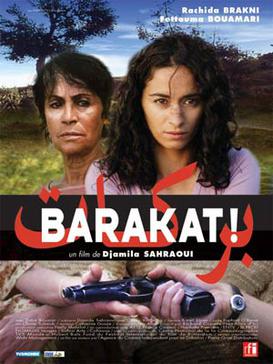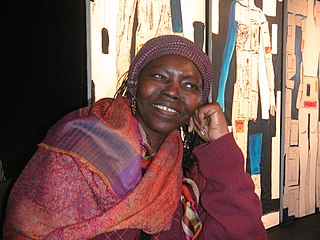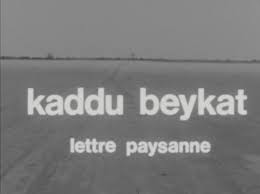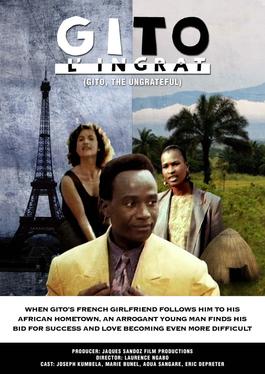
The Panafrican Film and Television Festival of Ouagadougou is a film festival in Burkina Faso, held biennially in Ouagadougou, where the organization is based. It accepts for competition only films by African filmmakers and chiefly produced in Africa. FESPACO is scheduled in March every second year, two weeks after the last Saturday of February. Its opening night is held in the Stade du 4-Août, the national stadium.

Cinema of Africa covers both the history and present of the making or screening of films on the African continent, and also refers to the persons involved in this form of audiovisual culture. It dates back to the early 20th century, when film reels were the primary cinematic technology in use. During the colonial era, African life was shown only by the work of white, colonial, Western filmmakers, who depicted Africans in a negative fashion, as exotic "others". As there are more than 50 countries with audiovisual traditions, there is no one single 'African cinema'. Both historically and culturally, there are major regional differences between North African and sub-Saharan cinemas, and between the cinemas of different countries.
Oumarou Ganda was a Nigerien director and actor who helped bring African cinema to international attention in the 1960s and 1970s.

Barakat! ("Blessings!") is a 2006 French/Algerian drama film directed by Djamila Sahraoui. It premiered at the Berlin International Film Festival on 16 February 2006.
The Cinema of Niger began in the 1940s with the ethnographical documentary of French director Jean Rouch, before growing to become one of the most active national film cultures in Francophone Africa in the 1960s-70s with the work of filmmakers such as Oumarou Ganda, Moustapha Alassane and Gatta Abdourahamne. The industry has slowed somewhat since the 1980s, though films continue to be made in the country, with notable directors of recent decades including Mahamane Bakabe, Inoussa Ousseini, Mariama Hima, Moustapha Diop and Rahmatou Keïta. Unlike neighbouring Nigeria, with its thriving Hausa and English-language film industries, most Nigerien films are made in French with Francophone countries as their major market, whilst action and light entertainment films from Nigeria or dubbed western films fill most Nigerien theatres.

Safi Faye was a Senegalese film director and ethnologist. She was the first Sub-Saharan African woman to direct a commercially distributed feature film, Kaddu Beykat, which was released in 1975. She has directed several documentary and fiction films focusing on rural life in Senegal.

Kaddu Beykat is a 1975 Senegalese film directed by Safi Faye. It was the first feature film made by a Black African woman to be commercially distributed and brought international recognition for its director. Centred on a romance, it chronicles the daily lives of people in a rural Senegalese village.

The cinema of Senegal is a relatively small film industry which experienced its prime from the 1960s through to the early 1980s, but has since declined to less than five feature films produced in the last ten years. Senegal is the capital of African cinema and the most important place of African film production after its independence from France in 1960.

Sarraounia is a 1986 historical drama film written and directed by Med Hondo. It is based on a novel of the same name by Nigerien author Abdoulaye Mamani, who co-wrote the screenplay. The novel and film concern the real-life Battle of Lougou between Azna queen Sarraounia and the advancing French Colonial Forces of the Voulet-Chanoine Mission in 1899. Sarraounia was one of the few African tribal leaders that resisted the advances of French expansionists Paul Voulet and Julien Chanoine. The film won the first prize at the Panafrican Film and Television Festival of Ouagadougou (FESPACO) and was critically well received.

The Armchair is a 2009 Burkinabé film directed by Missa Hebié. It was written by Hebié and Noraogo Sawadogo. It won the Oumarou Ganda Prize at the 21st Panafrican Film and Television Festival of Ouagadougou. It was also screened at the 2009 Pusan International Film Festival in South Korea.
Zeka Laplaine, sometimes credited as José Laplaine, is a director and actor from Ilebo in the Democratic Republic of the Congo. The child of a Portuguese father and Congolese mother, he moved to Europe when he was 18. His 1996 short film Le Clandestin was featured at the 2010 Amakula International Film Festival in Uganda. He portrayed a cowboy alongside Danny Glover in Death in Timbuktu, a film within a film in the Council of Europe Film Award-winning film, Bamako. Laplaine is a member of France's "Guilde Africaine des Realisateurs et Producteurs".

Gito, l'ingrat is a 1992 Burundian comedy film directed by Léonce Ngabo.
Femmes aux yeux ouverts is a Togolese documentary film directed by Anne-Laure Folly. It covers the lives of contemporary African women in Burkina Faso, Mali, Senegal and Benin.
Anne-Laure Folly is a documentary film maker from Togo.
Les Oubliées is a 1996 documentary film directed by Anne-Laure Folly of Togo and shot in Angola.
Léonie Yangba Zowe or Zoe is a filmmaker from the Central African Republic.
Zalika Souley was a Nigerien actress, the first sub-Saharan movie actress, and one of the pioneering actresses of African cinema.
Yasmine Chouikh is an Algerian journalist and film director. Her first film, the romantic drama Until The End Of Time, won the Best First Feature award at Panafrican Film and Television Festival of Ouagadougou (FESPACO) in 2019.
Étalon de Yennenga is an award bestowed to distinguished individuals involved with the Burkinabe's silver screen, awarded by the Panafrican Film and Television Festival of Ouagadougou (FESPACO), in recognition of the grand prize for the Best Film. First commenced in 1972, it is considered as the most prestigious award in Africa cinema.









